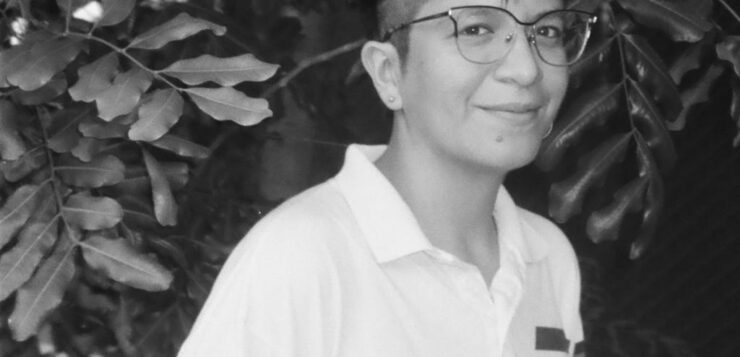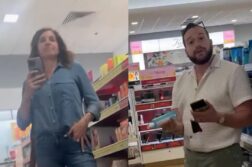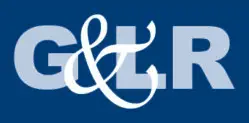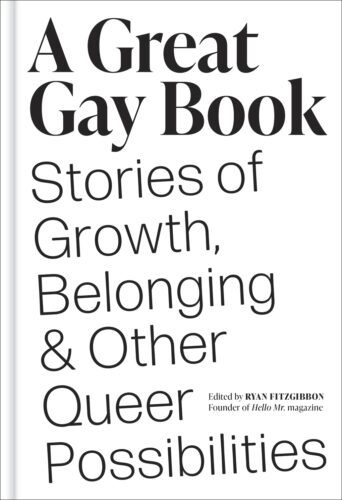
In 2017, Issues, a zine-in-residence initiative started by Hello Mr., transported Colby Anderson and Yezmin Villarreal’s visions for a queer alternative publication from an idea into a reality. BRUNCH CLUB, Colby Anderson’s publication, exclusively highlights trans and queer people of color. Dyke Queen, Yezmin Villarreal’s project, is a magazine about QTPOC literature, style, and art.
This twelve-week residency for creatives looking to develop a queer magazine concept provided support from editorial to event planning, with mentorship from media industry professionals. Each resident’s completed publication was distributed exclusively as an insert in Hello Mr.
As queer people, we’re often tasked with trying to survive the present moment, and we don’t always have the capacity to imagine a queer future for ourselves. Issues was a portal into the future, where the legacy of Hello Mr. will continue to live on.
Dyke Queen and BRUNCH CLUB editors/creators discussed the residency, queer zines, and why queer community is a vital and nourishing force of life. This conversation, which took place by phone, is excerpted from A Great Gay Book: Stories of Growth, Belonging, & Other Queer Possibilities by Ryan Fitzgibbon, published by Abrams. It has been edited for length and clarity.
COLBY ANDERSON: BRUNCH CLUB was launched in 2017 from me reaching out to [Hello Mr. founder] Ryan [Fitzgibbon] for advice, wanting to know more about the industry, which led to the creation of Dyke Queen. The title has always screamed “confidence” to me. Where did the idea for Dyke Queen come from?
YEZMIN VILLARREAL: I moved to LA in 2014. I really wanted to break into journalism, and I actually wasn’t out publicly. Nobody really knew that I was gay. I’m from Phoenix, AZ, and when I moved to LA, part of me thought, ‘Oh, if I move to Los Angeles, I can go be gay and free. My family won’t know, people I grew up with won’t know.’
CA: Yeah, that’s a similar reason as to why I moved to New York.
YV: One of the first gay stories I covered as a freelancer for LA Weekly was about Maricón Collective. They threw parties to create community for queer Latinx people. It was the coolest thing—I had never been around queer spaces at all before coming to LA, really. The funny thing is, when I interviewed queer subjects like Maricón Collective, they didn’t have any idea I was gay. I’m pretty sure I said, “Oh, I’m just doing this because it’s interesting.”
CA: You said you weren’t out. Were you just cosplaying a straight person?
YV: I was never open about [being queer], never said anything. I wrote a gay story, then more gay stories, and it led up to me applying for a job at the Advocate.
At the time I thought, How hilarious would it be if I get hired at a gay magazine—and I’m not even out; my own family doesn’t even know. When I got the job, the company told me they were starting another publication called Pride and asked if I’d help launch their website, which, of course, I did. I told my family I got a job at a magazine, but no other details.
CA: They never asked?
YV: No. My family, my mom and my dad, aren’t too comfortable speaking English. It was easy to obscure because they weren’t looking for it, you know? Magazines, especially in English, were kind of a foreign thing.
I was an editor at Pride for a while, then went back to the Advocate and was there during some significant times in queer history: marriage equality, Pulse, the Trump election. Around 2017, I got the idea for Dyke Queen.
I attended the LA Printed Matter Art Book Fair and was blown away, absolutely in heaven. But I was kind of disappointed that most everything queer was for gay men only. I was frustrated and thought, what about us? I wanted there to be cool art magazines for queer women. Some exist I know, but not as many. I pulled out my phone to write a reminder to myself in my notes app and wrote, Dyke Queen—a dyke mag I wish existed.
CA: We had the idea to create our publications in the same year. That’s pretty cool.
YV: What gave you the idea for BRUNCH CLUB?
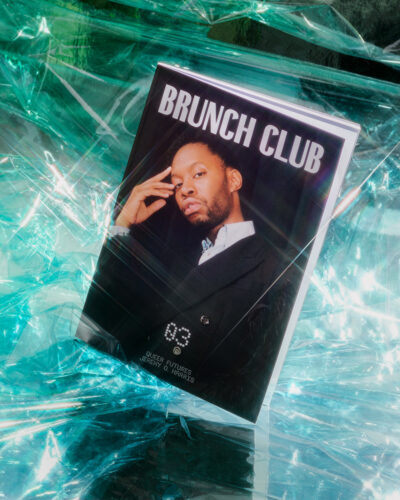
CA: I moved to New York in 2016 after college with just two suitcases and no job experience. I worked many temporary roles until I realized I wanted to create something that set me apart. Lots of queer people in New York do that: create passion projects that will help them get where they want to be.
I messaged Ryan, told him I admired his work. I wasn’t expecting a reply! He invited us to his office and we talked about BRUNCH CLUB as more than just a lifestyle. He had started a residency that taught people about publishing. BRUNCH CLUB became the first zine-in-residence! We created it for queer people of color. Queer media had mostly been run by white gay men, and we wanted to find ourselves and our community within the landscape.
Sometimes BRUNCH CLUB doesn’t get a ton of engagement, but a white queer account will get much more. It’s hard to not pay attention to or care about that.
YV: Totally. It’s all celebrity. It often feels like straight media props up queer people for their own entertainment, you know? Queer culture has become more mainstream, but also not.
CA: Definitely. It’s usually the same familiar faces being promoted. Unfortunately, there is plenty of gatekeeping within queer media.
YV: Yeah, that’s what inspired me to start Dyke Queen. Wanting to shine a spotlight on all kinds of queer people of color, women of color—filmmakers, artists, all kinds of creators. There are few platforms that embrace QPOC artists without exploiting them—turning us into clickbait.
It’s important to create spaces that exist outside of the white gaze. A space of beauty and respect; of opportunities for queer women, nonbinary people, and trans people to share their amazing work in community with each other.
CA: Agreed. Having these magazines allows us to give people opportunities to tell their stories and as a result, uplift many. Giving someone a chance to be a cover star, telling them they’re important.
YV: Yeah. It’s cool putting an issue together, connecting all these people who maybe wouldn’t have gotten a chance to collaborate in a publication, you know?
CA: Definitely. It’s my favorite part of the process—finding creators and sparking conversations. Spending months creating and watching it come to life. Those collaborators become friends and feel like a community.
YV: Being a part of the Hello Mr. residency feels like family, so does Dyke Queen and BRUNCH CLUB. I’m excited for us both to keep growing and see where it goes.
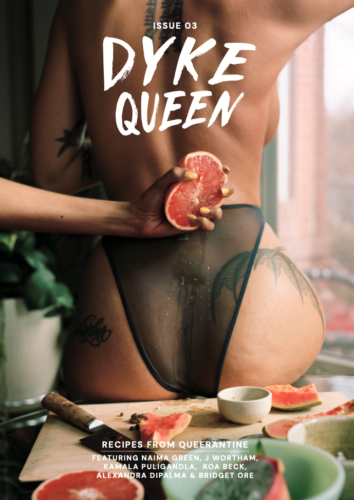
CA: Definitely. Zines have been around since the beginning of mainstream or public queerness. I read that Langston Hughes had a zine in the 1920s called Fire.
YV: Growing up, I didn’t know anything about queer history. There were some queer courses at my college but I didn’t take them. Really, I started learning about queer history for the first time through Instagram accounts such as @lgbt_history and @h_e_r_s_t_o_r_y.
Their feeds show an archive of queer people from the seventies to early 2000s. I fell in love with the photographs and zines they shared from back in the day. I used to look at their vintage images and think about all the queer people that came before us and how we still have a strong connection to the generations before us, even if it doesn’t feel tangible. I thought, Will it all be forgotten if we don’t archive it in our own way?
CA: I don’t know where I would be without the connections I’ve made online. Had I met them sooner, I probably would have come out much earlier. When I moved to New York, it was the first time I’d ever witnessed people calling themselves “queer” and totally owning it. Being from small-town Texas, it was hard to own it. I do now.
YV: Yeah, online communities have been so important for the development of queer culture. What feedback about BRUNCH CLUB has moved or surprised you the most?
CA: I struggled with imposter syndrome. When we have magazine events, I feel really seen and also simultaneously surprised by the compliments. Trying to learn to accept love and let BRUNCH CLUB do exactly what it’s supposed to do.
YV: It reminds me of this quote by Eileen Myles. They say that when you put out creative work into the world, it becomes a magnet—drawing the right kind of people toward it. The people that need to find you, find you.
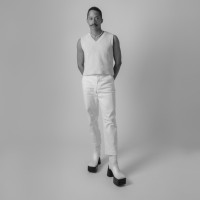
Colby Anderson is the creator of BRUNCH CLUB, a magazine centered on uplifting and telling the stories of trans and queer people of color. He currently lives and works in Brooklyn, New York.
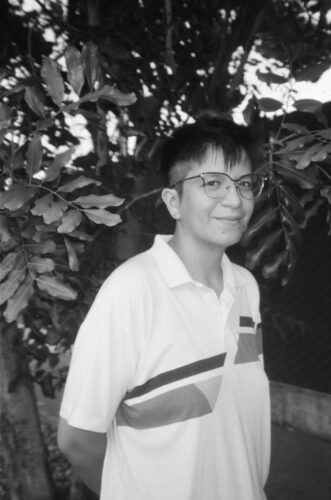
Yezmin Villarreal is a writer and editor living in Phoenix, AZ. In 2017, they launched Dyke Queen, a QTPOC magazine about art, style, and literature. Villarreal was formerly an editor at The Advocate, PRIDE, and Grindr’s Into.

